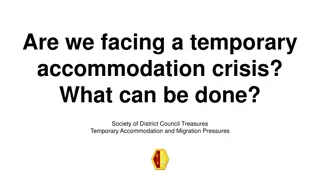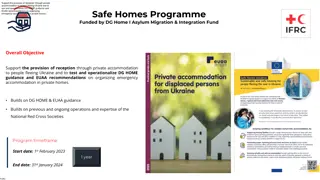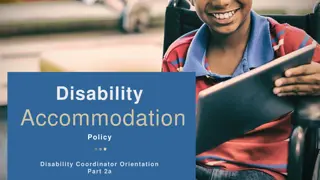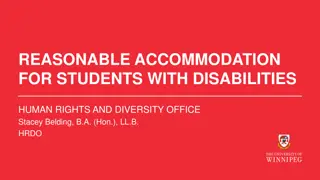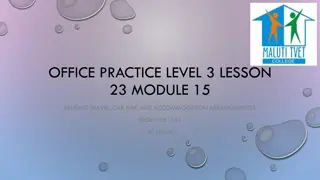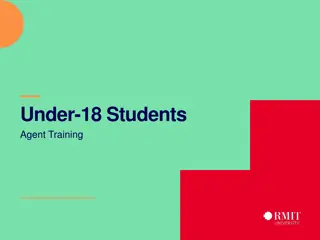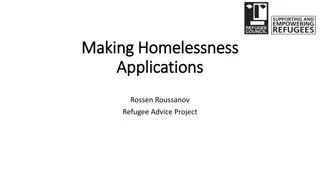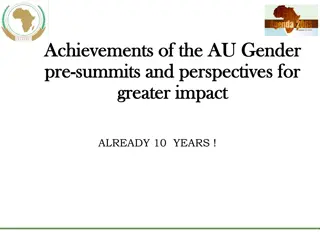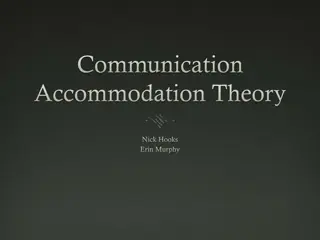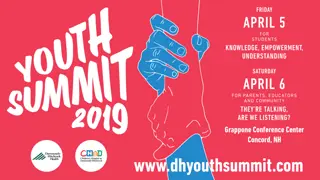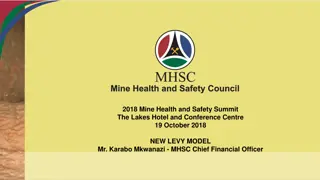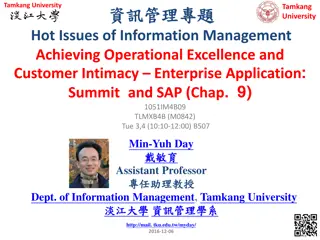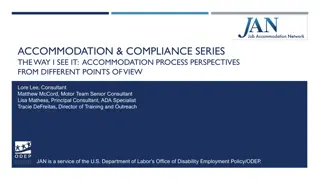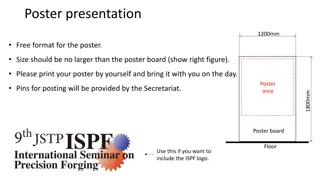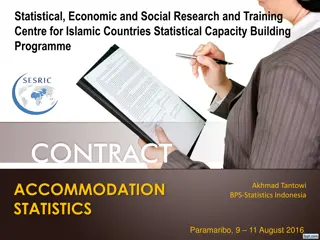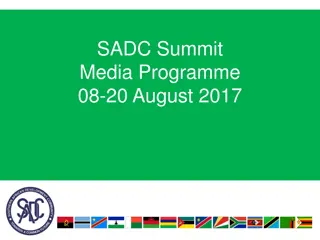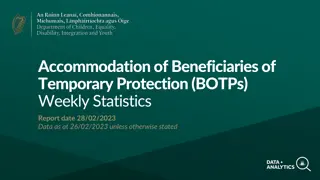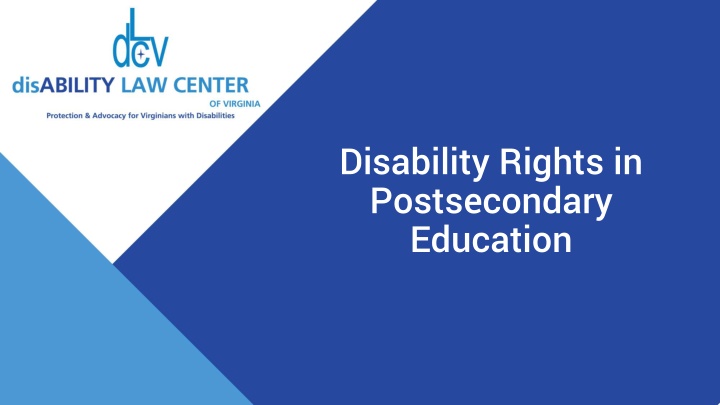
Disability Rights in Postsecondary Education
Learn about disability rights in postsecondary education, including definitions of disability, the Americans with Disabilities Act (ADA), Section 504 of the Rehabilitation Act, and the Virginians with Disabilities Act. Discover the mission of dLCVs and the services they offer to protect the legal rights of individuals with disabilities.
Uploaded on | 2 Views
Download Presentation

Please find below an Image/Link to download the presentation.
The content on the website is provided AS IS for your information and personal use only. It may not be sold, licensed, or shared on other websites without obtaining consent from the author. If you encounter any issues during the download, it is possible that the publisher has removed the file from their server.
You are allowed to download the files provided on this website for personal or commercial use, subject to the condition that they are used lawfully. All files are the property of their respective owners.
The content on the website is provided AS IS for your information and personal use only. It may not be sold, licensed, or shared on other websites without obtaining consent from the author.
E N D
Presentation Transcript
Disability Rights in Postsecondary Education
dLCVs mission To advance independence, choice, and self- determination; protect legal, human, and civil rights; and eliminate abuse, neglect, and discrimination of people with disabilities through zealous and uncompromising legal advocacy and representation.
dLCVs services and case selection dLCV provides free services ranging from general information about legal rights to individualized technical assistance, advocacy, and legal representation in selected cases. dLCV does not have enough staff or funding to represent everyone who contacts us. To ensure our limited resources are used wisely, we adopt annual Goals, Focus Areas, Objectives, and Case Selection Criteria to determine the types of cases we will take.
How is disability defined? A person who has a physical or mental impairment that substantially limits one or more major life activities. This includes people who have a record of such an impairment, even if they do not currently have a disability. It also includes individuals who do not have a disability but are regarded as having a disability.
Americans with Disabilities Act (ADA) Title II of the ADA prohibits state and local governments from discriminating on the basis of disability. Title II applies to public colleges, universities, and graduate and professional schools. Title III of the ADA prohibits places of public accommodation from discriminating on the basis of disability. Title III applies to private colleges, universities, and graduate and professional schools.
Section 504 of the Rehabilitation Act Section 504 states that "no qualified individual with a disability in the United States shall be excluded from, denied the benefits of, or be subjected to discrimination under" any program or activity that receives Federal financial assistance. Section 504 applies to all recipients of US Department of Education funding, including colleges, universities, and postsecondary vocational education and adult education programs.
Virginians with Disabilities Act (VDA) The VDA states that no public educational institution or private educational institution, or agent of either, that is a recipient of state funds shall deny admission to the institution, or full and equal access to and enjoyment of any of its educational or extracurricular programs, to an otherwise qualified person with a disability because of such disability.
Disabilities, Opportunities, Internetworking, & Technology (DO-IT) The DO-IT Center, based at the University of Washington, Seattle, promotes awareness and accessibility to maximize the potential of individuals with disabilities in the classroom. Their resources for educators include: Universal Design -making educational settings and tools accessible AccessCollege -helping colleges better serve students with disabilities Communities of Practice -for instructors and service providers
Universal Design (UD) UD is "the design of products and environments to be usable by all people, to the greatest extent possible, without the need for adaptation or specialized design. Instructors can apply UD principles to make courses more accessible to all students, thus minimizing the need for accommodations. For example, captions on video presentations may benefit students who are deaf, who hard of hearing, whose first language is not English, who have some types of learning disabilities, and many others.
Accommodations A student with a disability is the best source of information regarding needed accommodations. If a student requests disability-related accommodations or modifications directly from a faculty member, the faculty member should refer the student to the campus disability office.
Low Vision Accommodations Seating near the front of the class Large print handouts, lab signs, and equipment labels Monitors connected to microscopes or other lab equipment to enlarge images Class assignments in an accessible electronic format
Blindness Accommodations Course materials in braille or an accessible electronic format Verbal descriptions of visual aids, charts, graphs, and other images Raised-line drawings and tactile models of graphic materials Adaptive lab equipment (e.g., talking thermometers, calculators, light probes, and tactile timers)
Hearing Impairment Accommodations Interpreter or real-time captioning Notetaker Visual aids, written assignments, lab instructions, summaries, notes Use of email for class and private discussions
Learning Disability Accommodations Notetaker and/or audio-taped class sessions Captioned films Extra exam time, alternative testing arrangements Visual, aural, and tactile instructional demonstrations Computer with voice output, spellchecker, and grammar checker
Mobility Impairment Accommodations Classrooms, labs, and field trips in accessible locations Adjustable tables, lab equipment located within reach Class assignments made available in electronic format Computers equipped with special input devices (e.g., voice input, alternative keyboard)
Health Impairment Accommodations Notetakers Flexible attendance requirements Extra exam time Assignments made available in electronic format Use of email to facilitate communication
Laboratory Accommodations Give students a tour of the lab they ll be working in Assign group lab projects in which all students contribute according to their abilities Arrange lab equipment so that it is accessible to and visible by everyone Give oral and written lab instructions
Exam & Fieldwork Accommodations Ensure exams test the essential skills or knowledge indicated by the objectives for the class. Some students will require extra time to transcribe or process test questions. Include students in fieldwork opportunities, rather than automatically suggesting non-fieldwork alternatives. Ask students how they might be able to engage in specific aspects of fieldwork.
Resources - 1 Know your rights and responsibilities: https://www2.ed.gov/about/offices/list/ocr/transition.html Testing accommodations: https://www.ada.gov/regs2014/testing_accommodations.html Auxiliary aids and services: https://www2.ed.gov/about/offices/list/ocr/docs/auxaids.html Americans with Disabilities Act: https://www.ada.gov/
Resources - 2 Disabilities, Opportunities, Internetworking, and Technology https://www.washington.edu/doit/ National Center for College Students with Disabilities: https://www.nccsdonline.org/ Social Security work incentives: https://www.ssa.gov/work/WIPA.html Vocational rehabilitation: https://www.dars.virginia.gov/drs/vr/
CONNECT WITH US ADDRESS 1512 Willow Lawn Drive Suite 100 Richmond, VA 23230 PHONE 1-800-552-3962 (toll-free) | 804-225-2042 Spotify Logo Png - Free Transparent PNG Logos Twitter Icon - Royalty-Free GIF - Animated Sticker - Free PNG - Animated Icon Social, media, instagram, circle Free Icon of Social media (color) Icons Facebook icon - Free download on Iconfinder WEBSITE dLCV.org dlcv.org/podcast @disAbilityLawVA @disAbilityLawVA facebook.com/ disAbilityLawVA

